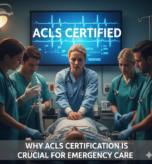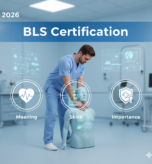When it comes to saving lives in emergencies, two certifications stand out in the healthcare field: Basic Life Support (BLS) and Advanced Cardiovascular Life Support (ACLS). Both are essential, but they serve very different purposes—and choosing the right one can impact your career, responsibilities, and ability to respond during critical situations.
As we step into 2025, hospitals and healthcare systems are becoming more strict about requiring life support certifications. Whether you are a nurse, doctor, paramedic, medical student, or healthcare technician, understanding the difference between ACLS and BLS will help you decide which certification you need—or whether you should get both.
This guide breaks down what BLS and ACLS are, who needs each certification, key differences, skills taught, validity, cost, and how to choose the right one for your career.
What Is BLS (Basic Life Support)?
Basic Life Support (BLS) is the foundational life-saving skill set required by almost all healthcare professionals—and even non-medical individuals working in safety-critical environments.
BLS focuses on:
High-quality CPR for adults, children, and infants
Early use of an Automated External Defibrillator (AED)
Rescue breathing and ventilation techniques
Relief of choking
Recognizing early signs of cardiac and respiratory arrest
Team dynamics in basic emergency response
Who Needs BLS Certification?
Nurses
Doctors
Paramedics
Caregivers
Dentists
Lifeguards
Medical students
Security staff in hospitals
What Is ACLS (Advanced Cardiovascular Life Support)?
While BLS covers the basics, ACLS takes emergency care to an advanced clinical level, making it essential for professionals who treat cardiac emergencies.
Many healthcare professionals also search for advanced training options such as an ACLS course, especially those working in high-demand regions like the UAE. For learners looking to upgrade their skills locally, choosing an ACLS course Dubai option or enrolling in hands-on ACLS training Dubai programs provides convenience, international accreditation, and updated AHA-based instruction.
ACLS includes advanced skills like:
ECG rhythm recognition
Advanced airway management (OPA, NPA, intubation support)
IV/IO access
Emergency drug administration
Managing cardiac arrest, stroke, acute coronary syndrome
Leadership in resuscitation teams
Using complex AHA algorithms
Who Needs ACLS Certification?
ICU nurses
ER nurses
Physicians
Anesthesiologists
Paramedics
Critical care teams
Advanced life support clinicians
If your role involves responding to adult cardiac emergencies, ACLS is mandatory.
Key Differences Between ACLS and BLS
Here’s the simplest way to understand the difference:
1. Level of Complexity
BLS: Basic CPR and AED
ACLS: Advanced medical interventions
2. Target Audience
BLS: All healthcare providers
ACLS: Professionals treating life-threatening cardiac cases

3. Skills Taught
| Skill | BLS | ACLS |
|---|---|---|
| CPR | ✅ | ✅ |
| AED Use | ✅ | ✅ |
| Ventilation | ✅ | ✅ |
| ECG Interpretation | ❌ | ✅ |
| Emergency Medication | ❌ | ✅ |
| Advanced Airway | ❌ | ✅ |
| Team Leadership | ✅ | ✅ (more advanced) |
4. Certification Validity
Both valid for 2 years (AHA standard)
5. Required Before ACLS
BLS certification is usually mandatory before taking ACLS.
Which Certification Do You Need in 2025?
Choosing between BLS and ACLS depends entirely on your job role and career plan.
You need ONLY BLS if you are:
A caregiver
Medical student
Lab technician
Dental assistant
Healthcare support staff
You need BOTH BLS + ACLS if you are:
ER nurse
ICU nurse
Paramedic
Physician
Critical care staff
Anesthesia technician
If you’re unsure, here’s a rule:
If your job involves cardiac patients → You need ACLS.
If your job requires basic emergency response → BLS is enough.
Why 2025 Is the Best Time to Get Certified
Healthcare hiring trends show increasing demand for certified staff. Hospitals prefer candidates with both BLS and ACLS because:
✅ It reduces their training cost
✅ It improves patient safety metrics
✅ It aligns with international standards
✅ It shows commitment & professionalism
Whether you work in UAE, Saudi Arabia, the US, or Europe, BLS and ACLS are universally recognized qualifications.
Career Benefits of BLS Certification
Makes you eligible for healthcare jobs
Ensures you respond confidently during emergencies
Improves your employability in hospitals and clinics
Helps you meet mandatory licensing requirements
How to Choose the Right Certification Center
When selecting a training provider, make sure they offer:
✅ AHA-based curriculum
✅ Experienced instructors
✅ Practical skill assessment
✅ Hands-on training with manikins
✅ Renewal reminders
✅ Updated guidelines (AHA 2025)
Should You Get Both Certifications?
In most cases: YES.
Hospitals increasingly prefer professionals with both BLS + ACLS because it shows readiness to handle all emergencies. If you plan a long-term healthcare career, getting both is a smart investment.
Final Thoughts
Both ACLS and BLS are vital, but they differ greatly in the depth of training and type of emergencies they cover.
BLS = foundational lifesaving skills
ACLS = advanced cardiac emergency intervention
As healthcare evolves in 2025, certified professionals are valued more than ever. Whether you’re starting your journey or aiming for advanced roles, choosing the right certification will help you grow, improve patient outcomes, and open new career doors.



